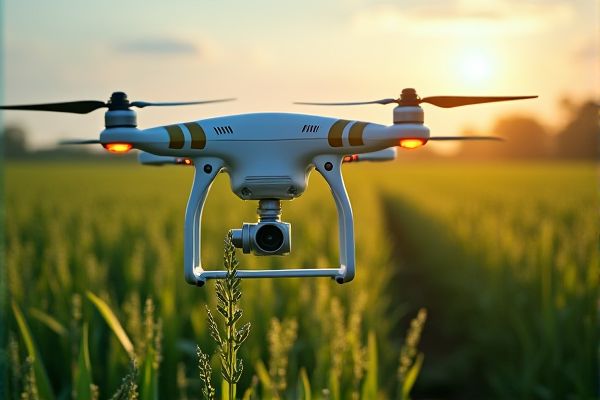
AI enhances precision agriculture through data analysis and decision-making support, enabling farmers to optimize crop yields and resource management. Advanced algorithms analyze satellite images, soil data, and weather patterns, informing farmers of the best planting and harvesting times. AI-driven tools facilitate real-time monitoring of crop health, detecting diseases and pests early, which minimizes losses. Automated equipment guided by AI can perform tasks such as planting, watering, and harvesting with precision, reducing waste and lowering operational costs.
AI usage in precision agriculture
Crop Monitoring
AI plays a significant role in precision agriculture by enhancing crop monitoring methods. Tools like drones and sensors collect data on soil health, moisture levels, and crop growth patterns, allowing farmers to make informed decisions. For example, a farmer using an AI-powered platform can identify areas needing water or nutrients, potentially increasing yield. This technology creates opportunities for optimizing resources, leading to improved efficiency and reduced costs.
Soil Health Analysis
AI technology has the potential to revolutionize soil health analysis in precision agriculture by providing detailed insights into soil composition and nutrient levels. By utilizing machine learning algorithms, farmers can identify specific soil conditions that optimize crop yields. Tools like SoilOptix can help assess soil variability across different fields, enabling targeted interventions. This personalized approach can lead to improved sustainability and reduced resource waste in farming practices.
Pest and Disease Detection
AI has the potential to enhance precision agriculture by improving pest and disease detection, which can lead to increased crop yields. By analyzing data from various sources, such as drones and soil sensors, AI algorithms can identify infestations early, allowing for timely intervention. For example, the use of machine learning models can predict the likelihood of certain pests affecting a specific crop, guiding farmers in preventive measures. Implementing such technologies may result in less pesticide use and healthier crops, benefiting both the environment and farm profitability.
Yield Prediction
AI can enhance yield prediction in precision agriculture by analyzing large datasets from various sources, such as satellite imagery and weather patterns. Farmers can utilize machine learning models to forecast crop outputs more accurately, potentially increasing profitability. This technology allows for more informed decision-making regarding resource allocation and crop management strategies. Institutions like the University of California are exploring these advancements to optimize agricultural practices.
Irrigation Optimization
AI can enhance precision agriculture by improving irrigation optimization, which may lead to better crop yields and resource management. For example, farmers can use AI-driven models to analyze soil moisture data, ensuring the right amount of water is applied at the right time. This could significantly reduce water waste and lower operational costs. The technology offers the potential for more sustainable farming practices, benefiting both farmers and the environment.
Precision Planting
AI has the potential to significantly enhance precision agriculture by optimizing resource use and improving crop yields. For instance, Precision Planting technologies can analyze soil health and moisture levels to determine the best planting times and locations. This data-driven approach may lead to reduced waste and increased efficiency in farming practices. The chance of achieving higher productivity and sustainability in agriculture is promising with the integration of AI tools.
Fertilizer Management
AI can optimize fertilizer management in precision agriculture by analyzing soil data and crop needs. Technologies like machine learning can predict the ideal amount and type of fertilizer for specific crops, improving yield while minimizing waste. Farms utilizing AI tools may experience enhanced efficiency and cost savings. For example, a crop consultant may implement AI-driven recommendations to fine-tune nutrient applications for corn production.
Weather Forecasting
AI in precision agriculture can enhance crop yields by analyzing soil health and optimizing resource allocation. Weather forecasting benefits from AI by providing more accurate predictions, which can help farmers make informed decisions. By integrating AI technologies, such as machine learning models, the agricultural sector may improve resilience against climate variability. This could lead to more sustainable farming practices, as seen with companies like Climate Corporation, which focus on data-driven solutions for farmers.
Drone Surveillance
AI in precision agriculture can enhance crop management by analyzing data from various sources. Drone surveillance enables real-time monitoring, allowing farmers to identify issues like pest infestations or nutrient deficiencies quickly. This combination can lead to improved yield and resource efficiency. Technologies from institutions like the University of California are exploring these innovations to maximize agricultural productivity.
Farm Machinery Automation
AI has the potential to enhance precision agriculture by optimizing crop yields through data analysis and monitoring. For instance, smart sensors can analyze soil conditions and predict plant health, allowing farmers to make informed decisions. Farm machinery automation can further streamline operations, reducing labor costs and improving efficiency. Leveraging AI technologies can position agricultural businesses for greater competitiveness in a demanding market.
 techknowy.com
techknowy.com